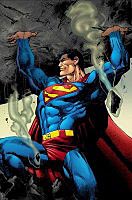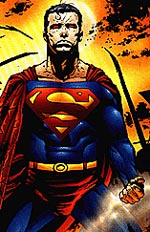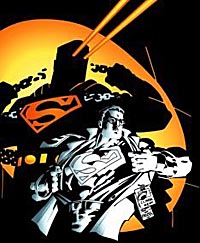>> The Friday Review: The Losers: Ante Up
>> The Friday Review: Marvels
More...

Someone once asked me if I cried when Superman died.
 It was a question asked in all seriousness, and I replied in kind: Of course not, what a bloody stupid thing to ask. For one thing, Superman is a fictional character, and while its not unheard of to mourn for same, the Man of Steel is not one I'm emotionally invested in. For another, it was patently clear that he was going to be resurrected, and the Reign of the Supermen arc bore that out. That didn't stop me from devouring each chapter, however, back in 1993.
It was a question asked in all seriousness, and I replied in kind: Of course not, what a bloody stupid thing to ask. For one thing, Superman is a fictional character, and while its not unheard of to mourn for same, the Man of Steel is not one I'm emotionally invested in. For another, it was patently clear that he was going to be resurrected, and the Reign of the Supermen arc bore that out. That didn't stop me from devouring each chapter, however, back in 1993.
Some time ago, there was a letter in the TV section of my metropolitan newspaper that took the producers of current US network sensation SMALLVILLE to task over perceived errors. The litany of (purported) inaccuracies included:
- Kryptonite being discovered while Clark Kent was still a teenager
- Pete Ross being of African-American background; and
- Jon and Martha Kent being much younger on screen compared to the comics.
Talk about the point being missed by a wide margin. SMALLVILLE is meant to be a latter-day reworking of the Superman mythos - an Ultimate Superboy, if you will. While it borrows hodge-podge from other successful shows (THE X-FILES, DAWSON'S CREEK, BUFFY), that it works is testament to the durability of the characters and milieu that Siegel and Shuster imagined into life some sixty years ago.
Now, you would think that having made such a splash in the mass media, DC would make an effort to capitalise on the moment, and draw attention to the Superman franchise. Given that DC's stable of characters has enjoyed a healthy relationship with TV and Hollywood over the years (despite the BAM! POW! ZAP! onomatopoeia that comic books still conjure up in the mind of the general public) publishing a SMALLVILLE tie-in book would be a no-brainer.
 With a second season of SMALLVILLE now underway (another DC property optioned for TV, BIRDS OF PREY, unfortunately died a quick death), DC editorial is well poised to strike while the iron is hot - despite taking its time to pull out its hand and do so. A SMALLVILLE series recently debuted, and there has been a major promotional push for the Superman line proper underway, spearheaded by SUPERMAN: THE 10-CENT ADVENTURE.
With a second season of SMALLVILLE now underway (another DC property optioned for TV, BIRDS OF PREY, unfortunately died a quick death), DC editorial is well poised to strike while the iron is hot - despite taking its time to pull out its hand and do so. A SMALLVILLE series recently debuted, and there has been a major promotional push for the Superman line proper underway, spearheaded by SUPERMAN: THE 10-CENT ADVENTURE.
Hey, if it worked once, why not do it twice?
Cynicism aside, trying to lend what was (until recently) a moribund franchise some sort of momentum is commendable. DC has spent the past year shoring up the BATMAN family of titles - "Bruce Wayne: Fugitive/Murderer"; Jim Lee and Jeph Loeb on the BATMAN title proper; cancelling AZRAEL - and the Last Son of Krypton was due the same consideration. One has to wonder, though, if this is only so much window dressing to paper over the cracks.
Think quick: When was the last time the Big Blue Boy Scout caught the imagination of the public and the eye of the media? Five years ago, when Superman's costume was changed as he developed electricity-based powers. And what was the last time before that? When Doomsday killed Superman, and that was ten years ago. Creative changes and origin tweaks aside, the man in the street couldn't care less about what's going on with the Man of Tomorrow. Sure, while Superman still has his adherents in the creative and fan communities, the very fact that the character was taken for granted was what led DC to kill him off in the first place.
The essential problem with the SUPERMAN titles can be summed up in two words: status quo. When John Byrne rebooted the continuity in 1986, what followed was a breath of fresh air, compared to the stagnation the Superman books underwent in the 70s and early 80s. To wit:
- Superman wasn't all-powerful, i.e. able to move planets out of orbit at a whim.
- Lex Luthor out-manoeuvred Superman once or twice.
- Lois Lane actively disliked Clark Kent early on(post-reboot).
Change was the name of the game until Byrne departed. Once that happened, the status quo gradually re-established itself, until the books once again became samey and predictable. (Sure, Lois and Clark fell in love and got engaged - and Lois found out about the Clark/Superman dichotomy in short order - but even that relationship succumbed to inertia.)
Indeed, the Superman line of books has wobbled between the dissolution of the status quo (Superman exiled/dead/powers or outlook changed) and its restoration (Lois and Clark happily married; Superman beyond reproach in reputation and profession) so damned often, you can set your watch by the pendulum swings. Undoing Superman's status quo on such a regular basis has become, in and of itself, the status quo.
 Nowhere was this made more apparent than in ACTION COMICS #775, the much-discussed (and maligned) issue wherein the Metropolis Marvel took on the Elite, a bastardised version of the Authority, all in an effort to prove that Truth, Justice and - this is the part that sticks in my craw - the American Way still works. By default, Superman had become the embodiment of the status quo, fighting against change for all things Right and Good. That's some distance from a character who used to tackle wife-beaters and petty dictators, way back when.
Nowhere was this made more apparent than in ACTION COMICS #775, the much-discussed (and maligned) issue wherein the Metropolis Marvel took on the Elite, a bastardised version of the Authority, all in an effort to prove that Truth, Justice and - this is the part that sticks in my craw - the American Way still works. By default, Superman had become the embodiment of the status quo, fighting against change for all things Right and Good. That's some distance from a character who used to tackle wife-beaters and petty dictators, way back when.
In contrast, on the creative front, the artistic depiction of Superman seems to have embraced the modus operandi of change for change's sake. As typified by Ed McGuiness, the feel and presentation has moved from the style best embodied by Dan Jurgens ('old school,' for lack of a better appellation), to what seems to be a variation on the American Manga style (think Joe Madureira). Witness Carlos Meglia's recent stint on ADVENTURES OF SUPERMAN, which was, to be kind, hard on the eyes. Noises have been made about a pull back in the other direction, and the recent addition of former BATMAN artist Scott McDaniel seems to be a step in the right direction.
Additionally, SUPERMAN: THE MAN OF STEEL was recently cancelled, allowing for (one hopes) a sharper focus and tighter storytelling. This leaves the remaining three titles under the aegis of the Man Of Action studio of creators: recently appointed SUPERMAN writer Steven T Seagle, rockstar pudding Joe Casey on ADVENTURES, and Joe Kelly remaining on ACTION. Keeping the tale weaving under the one (virtual) roof should lead to greater consistency between the three books.
At last, a change to the status quo appears to loom large. It remains to be seen if these changes are effective, let alone permanent, but I wouldn't be surprised if a year or so from now, the titles feel and read much the same as before. Lets hope its more a case of 'Up, up and away!', and less 'Whatever happened to the Man Of Tomorrow?'

This article is Ideological Freeware. The author grants permission for its reproduction and redistribution by private individuals on condition that the author and source of the article are clearly shown, no charge is made, and the whole article is reproduced intact, including this notice.


